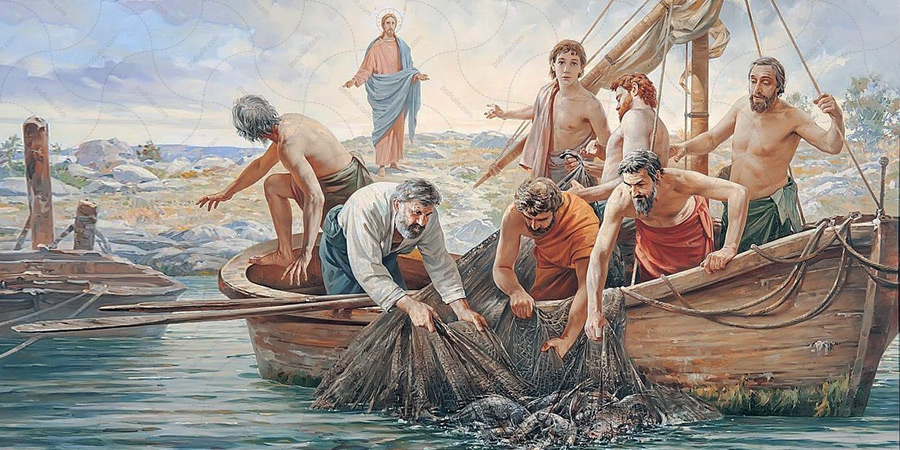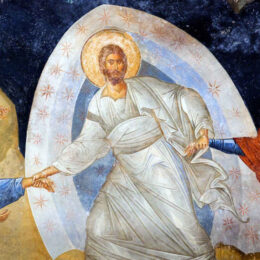 by Fr. Philip LeMasters –
by Fr. Philip LeMasters –
If there is any virtue that seems completely foreign to our culture today, it is patience. From fast food to cell phones, from transportation to losing weight, we want instant results and think that something is wrong if we do not get what we want immediately. Thoughtful people learn, however, that disappointments and delays are often actually good for us. They inspire us to see ourselves and the realities of life more clearly. But when impatience becomes a settled habit, it blinds us to the necessity of humble persistence in facing life’s challenges, both small and great.
Peter, James, and John were professional fishermen who had worked all night and caught nothing. They knew that it was time to wash their nets, go home, and try again tomorrow. But the Lord said, “Put out into the deep and let down your nets for a catch.” Peter answered in a way that showed his frustration: “Master, we toiled all night and took nothing! But at Your word I will let down the nets.” When they did so, they caught so many fish that their nets broke and their boats began to sink.
That was not only an unlikely and amazing scene; it also opened Peter’s eyes at least a bit to where He stood before the Lord, as he said to Christ, “Depart from me, for I am a sinful man, O Lord.” The Savior responded, “Do not be afraid; henceforth you will be catching men.” Then Peter, James, and John left their boats and nets behind as they became the first apostles.
Though Peter became the head disciple, he struggled mightily in faith. He denied the Lord three times before His crucifixion and had earlier heard the stinging rebuke, “Get behind me, Satan!,” when he had rejected the message that Christ would be killed and rise from the dead. After His resurrection, the Lord restored Peter by asking him three times if he loved Him and commanding him to “feed My sheep” in fulfilling his ministry. (Jn. 21: 15-17)
Peter was the first bishop of the Church in Antioch and in Rome, where he made the ultimate witness for the Savior as a martyr. He surely did not get everything right the first time. At many points in his discipleship, he must have been as frustrated as he had been as a fisherman who had worked all night and caught nothing. But despite his many failures in understanding what kind of Messiah he was following, Peter did not allow pride to keep him from accepting the Lord’s forgiveness and restoration. From the time the Savior first called him to the end of his earthly life, St. Peter kept letting down his nets and surely being shocked beyond belief that the Lord was still with him and working through him despite his less than perfect faith.
Saint Paul reminded the Corinthians that “now is the acceptable time; behold, now is the day of salvation.” He meant that we must not put off faithfulness to Jesus Christ until we think that our faith is perfect or that the circumstances of our lives are as we would like them to be. He described the ministry of the apostles as requiring “great endurance, in afflictions, hardships, calamities, beatings, imprisonments, tumults, labors, watching, hunger…in honor and dishonor, in ill repute and good repute. We are treated as impostors, and yet are true; as unknown, and yet well known; as dying, and behold we live; as punished, and yet not killed; as sorrowful, yet always rejoicing; as poor, yet making many rich; as having nothing, and yet possessing everything.”
By the conventional standards of this world, people like Sts. Peter and Paul were failures who acquired no wealth or power. They threw their lives away out of devotion to an obscure rabbi of first-century Palestine. There would never be an ideal time to be faithful to Him, for the Lord’s Cross would always remain foolishness in the eyes of the world. But had Peter not obeyed the command on that particular day, “Put out into the deep and let down your nets for a catch,” he would not have opened himself to receive the blessing of the great catch of fish.
Remember that it was this shocking scene that awakened in Peter’s soul at least a partial awareness of who he was before Christ, for he said, “Depart from me, for I am a sinful man, O Lord.” That is how he gained the measure of spiritual clarity that he needed in order to begin the long and difficulty journey of serving Christ.
Too often, we have less patience and faith before the challenges and disappointments of our lives than Peter did. Too often, we convince ourselves that it is pointless to persist in obeying Christ as best we can because our nets apparently remain empty of the blessings that we want for ourselves, our loved ones, and our world. Too often, we impatiently conclude that there is no point in persisting in the difficult struggle of faithfulness to the Lord because we are not getting the quick results that we want.
To view the Christian faith in that way, however, is to make it a path for serving ourselves, not the Lord Who reigns from a Cross and an empty tomb. We will never enter His Kingdom by refusing all that does not operate on our schedules or according to our preferences.
Our calling, like that of Peter and the first disciples, is simply to obey Christ’s command to follow Him. When we stumble in doing so, we must cultivate the humble recognition of Peter, who said, “Depart from me, for I am a sinful man, O Lord.” When we recognize that we have distorted the way of Christ into a path for serving ourselves, we must offer the Jesus Prayer from the depths of our hearts as we reorient ourselves toward true faithfulness.
When we are tempted to abandon any of the basic practices of the Christian life because they do not appear to produce the results that we would like, we must humbly persist in them out of obedience and grow in our awareness that sharing in the life of Christ is not a magical path to achieving any goal of this life.
There is no guarantee of a net full of fish, of course, and the point of that miracle was not to make Peter successful in his line of work. It was, instead, to call him, James, and John as apostles who would become “fishers of men.” It was to draw them into the ministry of the Kingdom of God for the edification of the Church and the salvation of the world. They had to leave everything behind and endure profound trials, which revealed their need for greater spiritual strength.
Our vocations are far humbler than theirs, but we must trust that Christ is preparing us to become “fishers of men” through our own struggles in ways that we do not fully understand. We can give up and say that there is no point in pursuing a religion that does not quickly solve all our problems in life, but to do so is to refuse to accept that “now is the acceptable time; behold, now is the day of salvation,” regardless of how well we think that things are going.
Now is the time to let down our nets, even though we have fished all night, caught nothing, and would rather simply go home. We do not know the particulars of what God will do when we offer ourselves to Him in patient obedience, but we must trust that doing so will enable us to share more fully in the healing of the human person that Christ has brought to the world.
Looking to the example of the apostles, let us persevere in the daily struggle to be faithful even as we know that we are sinful people who can ask only for the Lord’s mercy. The greater awareness we have of our own brokenness, the more patient trust we will have that God is filling our nets as they need to be filled for our salvation and that of the world.
Let us persist in letting them down for a catch today and every day of our lives. That is the only way that we will grow in our participation in the life of Christ and become those who draw others to the blessedness of His Kingdom.
—————————————————
HT Pravmir.com. (Bolding of key words and phrases, and some minor content organizational changes made by blog editors to improve readability.)



